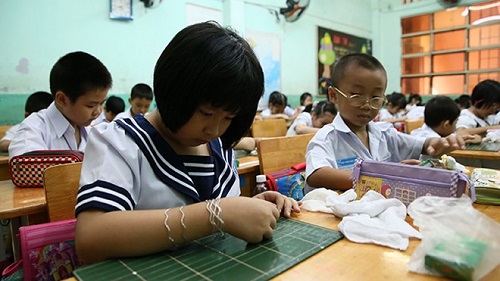Primary students to be given comments, not marks
The Ministry of Education and Training (MOET) has decided to apply a new student assessment mechanism in the 2014-2015 academic year, under which primary students will be given comments instead of marks.
According to Director of the MOET’s Primary Education Department Pham Ngoc Dinh, teachers will not assess students’ capability by giving marks to their school works, but by giving comments so as to help students develop their abilities and become more self-confident.
Teachers will supervise students, watch them, communicate with them and interview them to see how well they understand their lessons.
They will give oral comments to students or write comments in students’ books, pointing out the students’ level of understanding, and their ability to apply the knowledge they receive. Teachers will also need to identify students’ problems and the solutions to those problems.
 |
| The Ministry of Education and Training (MOET) has decided to apply a new student assessment mechanism in the 2014-2015 academic year, under which primary students |
Dinh said that though teachers will not give marks, they will still have other methods to assess students’ abilities. Students will know about their abilities by referring to the comments from teachers, classmates and their parents.
He went on to say that the principle of the new method is that students must be encouraged and not be put under pressure. Only when students can be put at ease and can study in favorable conditions can they realise their abilities.
Teachers will have to watch over the progress made by every student and understand the strong points of every student. Some students are good at math, while others are good at writing essays, and all abilities need to be encouraged.
“No marks, more comment – this is what the new mechanism aims to do,” Dinh said.
Students will still have to sit the year-end exams or tests and receive marks for the exams. However, teachers must not give zero marks to students. The highest mark of the scale is 10.
Another new regulation requires that schools minimize the percentage of repeating students.
Dinh said that weak students will receive assistance from their teachers so they can gradually improve their knowledge.
Only the very weak students, who cannot make progress after receiving assistance, will have to repeat classes.
“The permitted percentage of repeating students will be decreasing, while teachers will be required to increase their assistance to students,” Dinh said.
Educators were cautious when asked to make comments about the new proposals of the education ministry.
A teacher at a Ha Noi -based primary school said she was tired of the many changes made by the education ministry recently.
“The ministry wants a revolution in the national education system. However, it is necessary to think carefully before making any decisions,” she said, adding that many new regulations have been canceled because they were unreasonable and could not be realised.




